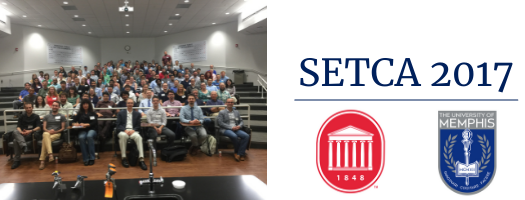Location
Coulter Hall, Room 211
Start Date
19-5-2017 3:10 PM
Description
Kohn-Sham Density Functional Theory (KS-DFT) is the most popular electronic structure method applied throughout science and engineering. The exchange-correlation (XC) local density approximation (LDA) was the earliest density functional used to investi-gate the electronic structure of chemical systems in KS-DFT. Since then, the LDA has been the bedrock of the field of density functional development. In this contribution, we discuss the roles of the non-local exchange and the local-density approximation in the improvement of the quality of the fundamental gap, and in the enhancement excitation-energy estimations. We suggest that the combination of these two concepts is dominant for the calculation of excitation energies of molecules in the optical regime and beyond. As an illustration of the wide range of possibilities created by our work, we report CAM-LDA0: a three-parameter functional, with 1/4 global and 1/2 long-range Hartree-Fock interaction, respectively; a range separation factor of 1/3; and pure LDA exchange and correlation. We show that CAM-LDA0 matches the accuracy of CAM-B3LYP for electronic excitations, with the advantage of reduced computational cost due to the omission of the generalized-gradient corrections. These findings have been recently reported in the The Journal of Physical Chemistry A [1].
- Carlos H. Borca, Purdue University
- Martín A. Mosquera, Northwestern University
- Mark A. Ratner, Northwestern University
- George C. Schatz, Northwestern University
Relational Format
Conference proceeding
Recommended Citation
Borca, Carlos H., "CL4. CAM-LDA0: The Reincarnation of the Local Density Approximation" (2017). Southeast Theoretical Chemistry Association Meeting (SETCA). 16.
https://egrove.olemiss.edu/setca/2017/schedule/16
CL4. CAM-LDA0: The Reincarnation of the Local Density Approximation
Coulter Hall, Room 211
Kohn-Sham Density Functional Theory (KS-DFT) is the most popular electronic structure method applied throughout science and engineering. The exchange-correlation (XC) local density approximation (LDA) was the earliest density functional used to investi-gate the electronic structure of chemical systems in KS-DFT. Since then, the LDA has been the bedrock of the field of density functional development. In this contribution, we discuss the roles of the non-local exchange and the local-density approximation in the improvement of the quality of the fundamental gap, and in the enhancement excitation-energy estimations. We suggest that the combination of these two concepts is dominant for the calculation of excitation energies of molecules in the optical regime and beyond. As an illustration of the wide range of possibilities created by our work, we report CAM-LDA0: a three-parameter functional, with 1/4 global and 1/2 long-range Hartree-Fock interaction, respectively; a range separation factor of 1/3; and pure LDA exchange and correlation. We show that CAM-LDA0 matches the accuracy of CAM-B3LYP for electronic excitations, with the advantage of reduced computational cost due to the omission of the generalized-gradient corrections. These findings have been recently reported in the The Journal of Physical Chemistry A [1].
- Carlos H. Borca, Purdue University
- Martín A. Mosquera, Northwestern University
- Mark A. Ratner, Northwestern University
- George C. Schatz, Northwestern University



Comments
Download includes an expanded abstract with collaborators, institutional affiliations and cited references.